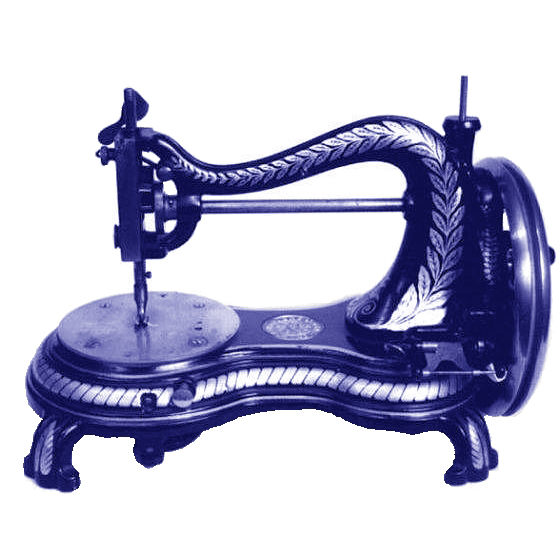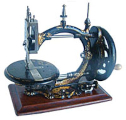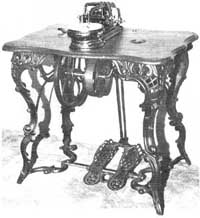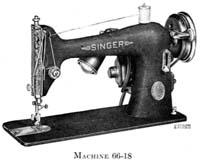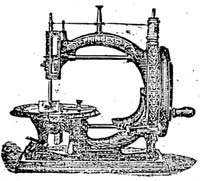The Way it Was
The way it was...
THE following story, in which three sewing-machine men at the turn of the century got together to discuss trade, past, present and future, appeared in the Sewing Machine Gazette.
The picture of the future may have been painted a tad rosy, but the whole will make interesting reading today. GF
JUST AS many hundred years ago the island of Great Britain was full of dense forests and populated by wild animals which have been so much demolished that successful professional businesses men with sporting proclivities and leisure complain that there remains nothing to shoot, thus making it hard to gratify what is recognised as an Englishman's special delight of having something to kill, so it was in connection with a shorter period of say 30 years ago, and in regard to a more interesting subject, at any rate it must be so to a "nation of shopkeepers", a Frenchman's description, and never disowned by a Britisher.
Thirty years ago - ah, what changed since then - the prejudices against our own particular trade and the inoffensive sewing machine, were as rank as the old forests, and like the wolves and their kin, they have been so completely annihilated that there remains no more to destroy.
A Singer machine in 1870 was sold for £9; the same machine, with stand, is now sold at £5 for cash. A machine on hire could only be obtained then at 4s 6d per week, with a deposit of not less than £3, and three reliable references required, and the 4s 6d was paid every week and no arrears permitted.
We all know too well the present and often unsatisfactory comparative standard, standards mostly made by those interested in producing something better. How much have you done, friendly reader, to cause this? How much will you do to cure it?
A territory which then put out five machines a week now does over 200 - a mighty stride. Then there was not a single power factory in existence. Now one firm can total up over 60,000 machines of their make, at present in use in factories in this country, for leather, shirts, clothing, etc, driven by electric, steam gas or water power.
Just about, or a little over, a quarter of a century ago, Singer's had a domestic machine and a tailoring machine, and did little or nothing in the leather world. Now they hold the field and have the lion's share in connection with all machines in all departments where sewing of any kind is done.
It is astonishing to find that they make upwards of 400 different kinds of machines for manufacturing purposes alone, and so great is the variety in kind of machine and cabinet work that no less than over 2,000 different combinations can be made in household or domestic machines, surely enough choice to satisfy the most fastidious buyer.
Then this same firm had 30 shops; it has now over 400. Then this remarkable house had less than 100 salesmen. Now it musters over 4,000 and whether situated in England, Ireland, Scotland or Wales they thrive and contentment reigns.
Efficient saleswomen, mechanics, clerks and others are, of course, as must be the case, largely increased in proportion and are much more skilful in their work.
Then a collector had to work for many weeks before he could earn 30s a week. Now he can earn that, or more, the first week. Years ago there was no "extra pay". Now, "one who knows how" can make a handsome addition to his regular income, and the fact that Singer's pay over £1,000 per quarter in this way is quite enough to prove what the possibilities are, and it not an isolated thing to find a collector making over £10 in a single quarter in this way.
To know more, to do more, is to earn and get more. To give a little study to the trade, to know what he is selling, how to make slight adjustments, and to know to whom he is trying to sell, a moderate amount of industry given, and the average collector will try such a situation an investment not easily beaten.
It is really a good return for an effort that is usually not extravagant. It is doubtless the case in all or in many businesses - at any rate, we know it is so in ours, and of course we naturally speak with more confidence about what we know than about what there may be a certain amount of speculation - that a great deal of benefit is lost to both employers and employers of all classes by not being sufficiently interested in their work, and by not seeking to make or manufacture interest, and the result is that the employment that would otherwise be a pleasure is, to a certain extent, a hardship.
It is surprisingly easy for any person to so cultivate a taste and knowledge about their own particular work so as to make it as hard to leave off as it is very often for one who has no interest in his work to begin. Then most of the small trade was done through buying agents; now, there are practically none.
Then there was such a glorious muddle that few knew or could claim their own name. Now, like sound Macadamised roads, supplanting the forests, each possess an unmistakable title. Then there were no aids to sell and no inducements to the buyer; now, they are both almost unlimited. Then a sewing machine was little more than a substitute for a thorn. Now it is, in addition to being the housewife's best friend, an artistic article and a real home decorator.
Then it was considered an event for a householder ordinarily situated to buy a machine for cash - hire was not born; now, Singer's alone hire out in Great Britain and Ireland over 160,000 machines annually, their total output being over 200,000, and count amongst their patrons and customers not only members of the Royal Family, but the keeper of Eddystone Lighthouse and a resident at the summit of Ben Nevis (the highest points on land and water), not to mention Li Hung Chang.
So much for "As it was". The glorious past, the good old days of moss-covered walls, when George the Third was king. The most satisfactory part of the past to the modern man is that it is past, and he does not hanker after its return.
"As it is". Look at the elegant premises; see the progress made in window dressing. Cast your recollections over Kilbowie, Guide Bridge, Oldham, and remember little America, and do not forget St Paul's.
Belief is strong today in the continuation of the business and its ever-advancing progress. How in all the world could the world do without the sewing machine?
Flowers so real can now be made on the sewing machine that the busy bee is deceived and alights to get the honey, but the salesman has stolen a march on him.
Birds mistake the apricot and the peach done on the sewing machine for real fruit, and are disappointed because they cannot peck it. Who would not live in the present?
"As it will be". Ah, who can tell? Probably no treadles; electricity will kindly provide the power, and what is now considered fast will be an ancient notion.
The facility to buy and sell will be so improved that the idea of having one sewing machine in a home will be treated like the old-fashioned idea of the one seven-day clock for a domicile.
Now we find a clock in every room, and each inmate owns a watch. As we also find each member has a cycle, why should not Ethel, Annie and Lena each have a sewing machine?
One wants to darn the table linen, the other make a frock, while Lena finishes the picture. Of course one machine would do any or all, but not at the same time. Still this may come.
It may or may not be possible to dispense with the needle. We do not see our way clear to do it just now, but we have had so many surprises that we should like to pledge ourselves, and be bold enough to say that it is impossible.
"Honesty is the best policy" will become so thoroughly established that there will be no defaulters, and fidelity fund and guarantee fund no longer necessary.
Singer's had less cases of this kind last year than they have had for 10 years, with many more employees - very creditable to the employees.
Whether there will be only one or more firms is doubtful, but the fact that the firms devoted to sewing machines alone may be counted on a third of one's fingers rather suggests a singular number.
Repossessions will decline, because people will take machines to keep, and not to return.
Average sale value will advance, because a sewing machine will more and more become an article of furniture, and this will increase a salesman's income in more ways than one.
Because of the machine becoming more prized, payments will be better, and there will be more at 2s 6d and 2s and less at 1s 6d. Pounds will be paid when often nothing in the past was forthcoming.
Reserve staffs will be recognised more as a permanent and less as a temporary institution. There will, of course, be only one Sewing Machine Gazette, and it will be taken by every employee in the trade, and it will grow in popularity, and be even better liked than ever, because of its fairness and its independent views.
Never mind - Was, Is or Will be. Remember, nobody but a chemist can be a chemist. No matter how astute a lawyer is, he would not earn as much as an engineer, and so on without limit.
Then, how singular when it is remarked that in the principal cities and towns in this country the best positions in the appointments of The Singer Manufacturing company are filled by representatives of such varied beginnings. Many originally clerks, others began as salesmen, some as mechanics and so on.
Does not such a peculiar and unique business, offering so many opportunities to so numerous and such diversified individuals, deserve a special vote?
Such a view cannot be applied to any other business or trade in the world, nor can it be so extensively applied to any other firm than The Singer Manufacturing Company in this remarkable trade.
It is a certainty that employees of every class of average ability can always insure continuous employment at more than average pay, and can increase the same correspondingly with increased usefulness, and people of special and above-average intelligence and industry can always obtain superior treatment commensurate with the skill employed.
